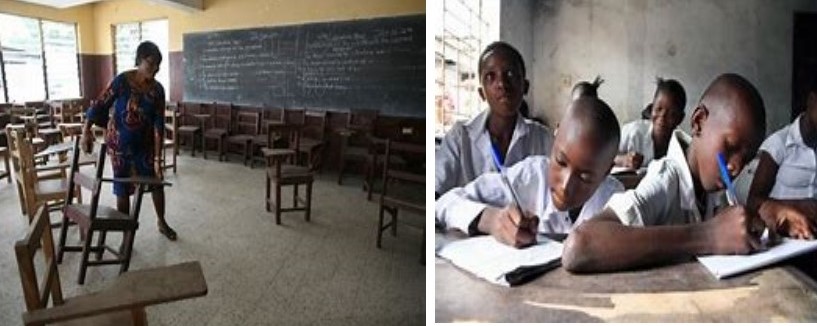By George Stewart, Contributing Writer
Liberia joined the world to celebrate International Literacy Day on Monday, September 9, with motivational speeches and adequate expression of commitments to fight out illiteracy from our borders.
A sizable and colorful observance of International Literacy Day in Liberia took place in the ballroom of the Monrovia City Hall. I stand to be corrected. But it appears like the full involvement of the Minister of Education, Prof. Ansu Sonii was not only distinct but unique to the 2019 International Literacy Day in Liberia.
It has always appeared moderate, leaving junior ministers in charge usually in the Tubman High Auditorium in Sinkor. 2019 presented itself prestigious as it was not just graced by the minister of Education, but also supported by the Monrovia City Council. Through it all, Monday, September 9 showed up like a real proclamation of the long-awaited war against illiteracy in Liberia.
All sounded like the real war against illiteracy had begun; for every speaker spoke like warrior prepared to face a fierce battle at doorsteps. Yes, Liberia celebrated International Literacy Day in adherence to the 14th Session of the General Assembly of the United Nations Educational Scientific and Cultural Organization (UNESCO) on October 26, 1966.
UNESCO was well intentioned when it set the aim of the International Literacy Day “to highlight the importance of literacy to individuals, communities and society”. Speakers, including learners who demonstrated their newly found skills in literacy, all acknowledged the fact that literacy is dignifying and supportive to the development of a person and community as envisioned by the framers of the International literacy Day 53 years ago.
As a literacy worker for nearly ten (10) years, I have realized from start that the change and effectiveness that literacy brings to a person have always been mind-blowing. I managed Southeast Literacy Project(2010-2013), covering River Cess, Sinoe, River Gee, Grand Gedeh, Maryland and Grand Kru Counties; on behalf of Alfalit International Liberia with funding from Swedish based MacCall MacBain Foundation. In Grand Gedeh County specifically, a Term II (intermediate) learner was fast hired as election worker in district legislative seat because she was one of few community dwellers with the reading, writing and comprehension skills. In the case of a women leader whom everyone looked up to for Lofa Women representation from Monrovia escaped signing for her group’s consignment at the 2011 Independence Day Celebration held in Lofa County. This was simply because the heavy weight of illiteracy weighed her down to shame. She ran from the queue under the pretense of picking a phone call. Thereafter, she restored her dignity and prestige as a leader by enrolling into the Omega Market Women Literacy Project of Alfalit Liberia.
The transformational stories are many and largely untold, but what remains evident enough is, our people live in depression and suffer disadvantages brought their way by the social disease of illiteracy.
International Literacy Day celebrations have always been characterized by ambitious speeches from all sectors including the government, civil society actors and the international community represented in Liberia. One of the influential factors of these huge speeches could be attributed to the emotions sparked by the testimonies and skill demonstrations of literacy students sampled at these celebrations. Even at that, the nation has spoken so well of the doable than the done. Liberia now needs to turn words into deeds to decease the illiteracy statistics of the country.
As a part of the whole, I advance the following as suggestions that may lead to a literacy-for-all campaign in Liberia. The Ministry needs to:
- Map up all literacy stakeholders: The Ministry of Education has the capacity to identify all literacy service delivery organizations including the colleges of education at the various universities.
- Convene a Strategic Session that identifies the strengths, weaknesses, opportunities and threats to lead to a concerted efforts for possible literacy for all campaign. The output of such gathering preferably is a strategic plan that serves as roadmap to illiteracy eradication in considerable period of time.
- Lunch a national resource mobilization campaign that supports the roadmap of the national literacy-for-all campaign.
- Assign service zones to all service providers for effective coverage and measureable outcomes.
The role of the ministry of education is basically to coordinate and outsource service provisions as in the case of offering literacy training to communities. By that, the ministry may be well positioned to carry out its regulatory function as opposed to being overwhelmed with service delivery added to regulations. Accountability in the sector of education still needs to be brought under proper control. Service providers including schools and charity organizations may perform more effectively with maximum quality outcomes once the government through the Ministry of Education is functioning more robustly as the regulator.
We need to be reminded that the effects of illiteracy are consequential not only to its victims, but also the entire community and nation. Liberia could turn almost all of its votes in 2013 into valid votes once literacy-for-all is a national emergency. Health service delivery could improve once the power of literacy affects each person who accesses health services.
Liberia could develop strong technical manpower, once literacy is acquired for all. Every Liberian, I suggest, knows another Liberian suffering illiteracy. Therefore, we all must and should fight illiteracy out of our communities.

